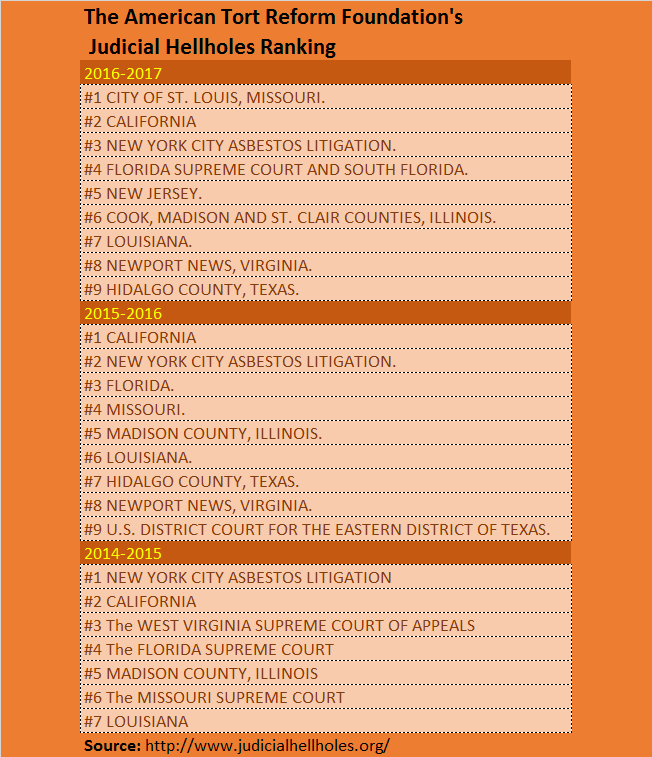St. Louis, Mo. edged out California and New York for top spots in the nation for unfair handling of civil litigation, according to the with The American Tort Reform Foundation 2016-2017 Judicial Hellholes report released earlier this month.
The main reason: ATRA blames “junk science”—in other words, a weak standard for expert testimony—which together with laws allowing easy forum shopping have resulted in four of the top six product liability verdicts in the United States this year coming out of St. Louis’s Circuit Court. Two of those where against Johnson & Johnson, alleging a link between talcum powder and ovarian cancer, according to a Sept. 29 Bloomberg report cited by ATRA. (“Welcome to St. Louis, the New Hot Spot for Litigation Tourists,” Sept. 29, 2016.)
Adding a third talc verdict, ATRA said three talc verdicts out of St. Louis this year totaled $197 million—”for plaintiffs from Alabama, South Dakota and California.”
“The overwhelming majority of plaintiffs filing these suits are not from St. Louis, or even from Missouri,” said American Tort Reform Association President Tiger Joyce in a statement. “They travel from across the country to exploit a weak venue law as their lawyers spend heavily on television advertising that works to prejudice potential jurors against defendants,” Joyce said.
Moving to second place on the hellhole list, California is still the site of more than 800 new laws every year—making it difficult for California residents and businesses to stay current or to avoid being named in any of the nearly 1 million new lawsuits filed there annually. The suits include disability access suits and lawsuits over workplace rules, pay-stub formatting, food and beverage labels, and environmental hazards, among others, the report says.
And New York continues to reign as a jurisdiction in which asbestos defendants are “guilty until proven innocent,” the report says.
“Not a single defendant implicated by a plaintiff’s exposure allegations has ever been granted summary judgment in Justice Moulton’s courtroom,” the report says, referring to the judge managing New York City’s Asbestos Litigation (NYCAL) docket. The “resulting threat of jury trials increases pressure on defendants to settle beforehand,” the report contends.
The report describes several specific cases in which the court denied summary judgment even where plaintiffs testified they did not recall being exposed to asbestos. In one case, brought by a mesothelioma claimant who alleged he was exposed to asbestos brought home on his father’s clothing, the judge refused to dismiss even after the claimant’s elderly father testified he did not believe he ever came into contact with asbestos. The court assumed that someone working as a mechanical engineer for many years “might reasonably be expected to come in contact” with it, the report noted, also going on to describe an different ruling by Justice Moulton in early 2016 that is troubling to ATRA.
This particular ruling opens the door for asbestos defendants to be “sued a second time by the same plaintiff, even after entering a settlement that fully releases them from liability.” In South v. Chevron Corp., Justice Moulton found that a settlement of a 1997 asbestos case forever discharging the defendant from “any and all actions …for the injuries, sickness and/or disease allegedly caused as a result of the exposure to asbestos” did not bar a second suit, reasoning that the prior release did not specifically mention cancer or mesothelioma.
The full report, “Judicial Hellholes: 2016-2017 is available here. An executive summary is also available.
The American Tort Reform Association is a national organization dedicated exclusively to tort and liability reform through public education and the enactment of legislation. ATRA’s membership includes nonprofits, small and large companies, as well as state and national trade, business, and professional associations.
The American Tort Reform Foundation (ATRF) is a District of Columbia nonprofit corporation founded in 1997. The primary purpose of the foundation is to educate the general public about how the civil justice system operates, the role of tort law in the civil justice system, and the impact of tort law on the public and private sectors.
“Since 2002, the American Tort Reform Foundation’s (ATRF) Judicial Hellholes program has identified and documented problems in jurisdictions where judges in civil cases systematically apply laws and court procedures in an unfair and unbalanced manner, generally to the disadvantage of defendants,” according to a preface to the report. More recently, the Judicial Hellholes report has evolved to include law and rulemaking activity, which can also significantly affect the fairness of civil litigation.
“The content of [the] report builds off the American Tort Reform Association’s (ATRA) real-time monitoring of Judicial Hellholes activity year-round at www.JudicialHellholes.org,” reflecting feedback gathered from ATRA members and other firsthand sources, as well as tips and additional information from others, which are researched independently through publicly available court documents, judicial branch statistics, press accounts, scholarship and studies.
Sources: ATRA, ATRF






















 Flood Risk Misconceptions Drive Underinsurance: Chubb
Flood Risk Misconceptions Drive Underinsurance: Chubb  AIG, Chubb Can’t Use ‘Bump-Up’ Provision in D&O Policy to Avoid Coverage
AIG, Chubb Can’t Use ‘Bump-Up’ Provision in D&O Policy to Avoid Coverage  Experts Say It’s Difficult to Tie AI to Layoffs
Experts Say It’s Difficult to Tie AI to Layoffs  Retired NASCAR Driver Greg Biffle Wasn’t Piloting Plane Before Deadly Crash
Retired NASCAR Driver Greg Biffle Wasn’t Piloting Plane Before Deadly Crash 